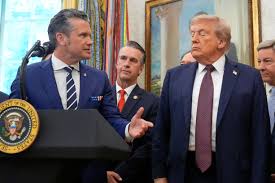
Raphael Kanu
In a move that has ignited sharp debate across the United States and beyond, President Donald Trump on Thursday announced that the Department of Defence will be renamed the Department of War, marking the most dramatic shift in the Pentagon’s identity in over seven decades.
The White House, in a statement, said the rebrand is designed to project “strength, clarity, and resolve” in America’s global posture. “The term ‘Defence’ is weak and misleading,” Trump declared during remarks at the White House. “America does not simply defend itself it wins wars. This name change sends a message to our enemies and to the world that the United States will never hesitate to strike when necessary.”
The decision revives a name that was last officially used in 1947, when the U.S. Department of War was reorganized under the National Security Act to become the Department of Defence.
The announcement has provoked fierce reactions from lawmakers, analysts, and human rights groups. Critics argue that the move glorifies militarism and undermines diplomatic efforts to frame U.S. power as a stabilizing force. Senator Elizabeth Warren condemned the rebrand as “reckless and provocative,” warning that it could damage America’s alliances. “Words matter. By renaming this institution, Trump is signaling to the world that America prioritizes conflict over peace,” she said.
Trump’s allies, however, defended the change as overdue. Congressman Matt Gaetz praised the move, saying it restores “historic honesty and patriotic clarity” about America’s global mission.
Within the military establishment, the response has been cautious. A retired four-star general, speaking anonymously, told reporters: “This may boost political rhetoric, but it risks alienating allies who look to the U.S. for reassurance, not intimidation.” Others, however, noted that the shift is largely symbolic, with no immediate operational impact on the Pentagon’s structure, budget, or command.
Internationally, the announcement has drawn attention from U.S. allies and rivals alike. China’s Foreign Ministry described the move as “a dangerous signal of confrontation,” while NATO officials said they were seeking clarification on its implications. In contrast, right-wing commentators in Europe praised the rebrand as a reminder of American resolve.
The name change requires congressional approval to be fully implemented, though the White House insists it is confident the measure will pass. If approved, the Pentagon’s signage, seals, and official documents would be rebranded as early as January 2026.
For now, America remains divided over whether Trump’s bold move represents a restoration of historical tradition or a reckless step toward a more militarized future.
